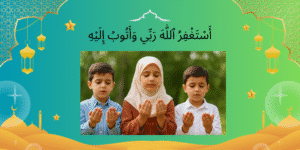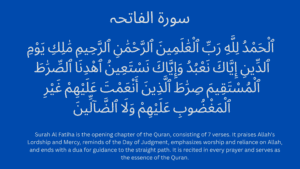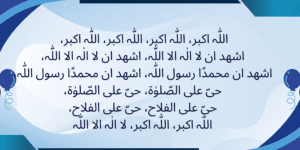Author Archives: admin
Learn Quran Online in Australia from Home with Certified Male & Female Teachers
Quran learning is a life long process and now more than ever it is possible [...]
Learn Quran Online in Bahrain with QariQuran
Discover the most trusted online Quran academy in Bahrain where students of all ages learn [...]
Umrah Dua for Protection and Peaceful Travel
Islam is a religion that directs every area of our lives. Apart from the five [...]
What Is Quran A Complete Guide for Beginners and New Muslims
What is Quran The Quran is the holy book of Islam and it is the [...]
Duas for Safe Travel & Spiritual Protection During Ramadan Umrah
Being a whole religion, Islam guides us in every area of life. Other than the [...]
Symbol of Islam Meaning History and Importance
The symbol of Islam is one of the most recognized signs associated with Muslims around [...]
Ramadan Umrah Duas for Forgiveness, Mercy & Blessings
No time of the year is more blessed than the sacred month of fasting, Ramadan. [...]
Budget-Friendly Tips for Planning Umrah
Many Muslims spend their lives saving up for the Umrah journey. This pilgrimage is the [...]
Common Mistakes During Umrah and How to Avoid Them
The Umrah pilgrimage holds great reverence among Muslims as it facilitates spiritual closeness to God [...]
Online Quran Classes in Canada Learn Quran from Home Easily
Are you looking for online Quran classes in Canada Whether you are a parent seeking [...]
Online Quran Academy USA Learn Quran with Tajweed from Certified Tutors
Online Quran Academy USA has become the top choice for Muslim families who want high [...]
Islamic Online Quran Academy – Learn Quran Online with Qualified Teachers
In today’s digital world, learning the Quran has become easier and more accessible than ever. [...]
Benefits of Surah Rahman The Beauty and Blessings of the Quran
Surah Ar Rahman is one of the most beautiful and soothing chapters of the Holy [...]
E621 Halal or Haram? The Truth About MSG (Monosodium Glutamate
E621 commonly known as Monosodium Glutamate (MSG) is one of the most widely used flavor enhancers [...]
Surah Mulk Benefits Powerful Blessings of Reciting Surah Al-Mulk Daily
Surah Al-Mulk (سورة الملك), the 67th chapter of the Quran, holds a special place in [...]
Halal and Haram in Islam Understanding What’s Permissible and Forbidden
Halal and Haram in Islam are the guiding principles that shape the moral ethical and [...]
Learn the Meaning of the Quran with Online Tafseer Classes
Online Tafseer classes help you understand the true meaning and message of the Quran with [...]
learn Noorani Qaida Online and Build a Strong Foundation for Quran Reading
Learn Noorani Qaida Online The First Step to Reading the Quran Correctly Learning Noorani Qaida [...]
Protection Prayers Finding Peace Under Allah’s Care
In today’s world, full of unseen fears, jealousy, and spiritual struggles, Protection Prayers are like [...]
Understand the real Astaghfirullah Mean and its blessings in Islam that purify your soul and attract Allah’s forgiveness.
What Does Astaghfirullah Mean? — A Complete Islamic Guide The phrase Astaghfirullah (Arabic: أَسْتَغْفِرُ ٱللّٰهَ) [...]
Learn the powerful Surah Waqiah Benefits for rizq, protection from poverty, and inner peace a true source of divine blessings.
Surah Waqiah Benefits – Unlocking the Blessings of Rizq and Wealth Introduction to Surah Al [...]
Surah Mulk Benefits – Why Every Muslim Should Embrace This Surah
Surah Mulk Benefits – Virtues, Rewards & Complete Guide Introduction to Surah Mulk Benefits Surah [...]
Surah Al Fatiha: The Key to Healing & Guidance
Surah Al Fatiha – The Opening Chapter of the Quran Introduction Surah Al-Fatiha is the [...]
Iman e Mufassal and Mujmal explained clearly. A complete, simple, and helpful guide to build your Islamic faith and core belief
Iman e Mufassal and Mujmal are the essential parts of Islamic faith that explain what [...]
Words of Azan (Adhan) – Unlock the Spiritual Message
The Words of Azan (Adhan) , Meaning, and the Islamic Call to Prayer The English [...]
Qari Quran Listen and Learn Beautiful Quran Recitation
Qari Quran Listen and Learn Beautiful Quran Recitation Qari Quran is an individual who recites [...]
Amazing Surah Quraish Benefits for Marriage, Health & Prosperity
Surah Quraish Benefits for Health, Wealth, and Spiritual Protection By reciting Surah Quraish (Juz 106 [...]
What is the Off-Season for Umrah?
What is the Off-Season for Umrah? Umrah costs have increased significantly over the last 8 [...]
Maghrib Prayer Secrets – Timing, Rakats & Sunnah Explained
How to Perform Maghrib Prayer: Step‑by‑Step Guide for Beginners” In Islam, there are five obligatory [...]
Trusted Online Quran Teacher Female – Learn with Expert Female Tutors
Online Quran Teacher Female Seeking a Female qualified Quran teacher? Should you or your children [...]
Dua e Istikhara: How to Ask Allah for Guidance in Important Decisions
Dua e Istikhara – A Powerful Way to Seek Allah’s Guidance What’s Istikhara? Istikhara is [...]
Benefits of Surah Al Muzammil for Rizq, Job, Marriage & Protection
Benefits of Surah Al Muzammil for Rizq, Job, Marriage & Protection Chapter 73 Surah [...]
Meaning of Inshallah: Discover the Power Behind This Beautiful Islamic Phrase
What Does Meaning of Inshallah in islam ? An Arabic expression, which means God willing [...]
Online Noorani Qaida Tutor
Online Noorani Qaida Tutor Learning Noorani Qaida with an online Noorani Qaida tutor is becoming [...]
Learning Quran for Beginners– A Step-by-Step Guide to Start Your Spiritual Journey Online
It is a step-by-step guide that introduces an aspirant to how to read the Quran [...]
Surah Waqiah Benefits: A Powerful Source of Rizq, Barakah, and Protection
Surah Al-Waqi’ah (Arabic: سورة الواقعة), the 56th chapter of the Qur’an, is one of the [...]








































